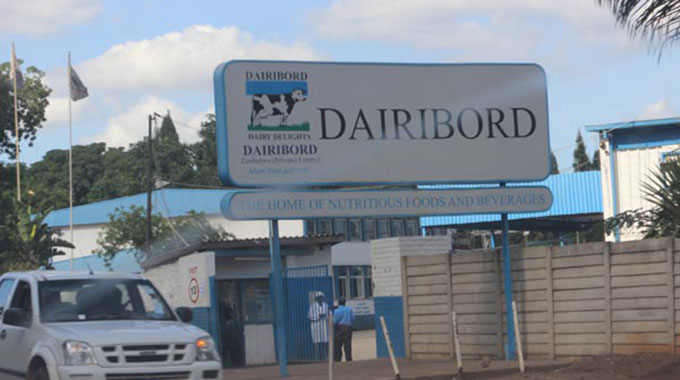Dairibord sales volumes down 40pc

Fradreck Gorwe
Zimbabwe Stock Exchange-listed manufacturer and supplier of dairy products, Dairibord Holdings posted a decline in sales volumes by 40 percent for the third quarter to September 2019, in comparison with 2018 comparative trading period.
In a trading update released yesterday, management said the drop in sales volumes owed largely to supply side constraints, namely continual deterioration of macro-economic fundamentals compounded with foreign currency, electricity and water shortages.
“These in turn led to low production output, increased utility costs and depressed consumer disposable incomes,” according to the performance update issued by company secretary Mercy Ndoro.
“Foreign currency supply shortages persisted, negatively impacting ability to meet demand. Depreciation of the local currency resulted in increased costs of materials and other key inputs,” Ms Ndoro said.
“Production output and operating costs were adversely impacted by the worsening erratic supply of water and electricity.”
She said the significant adjustments in the prices of fuel and electricity resulted in increased cost structures across the economy while the use of diesel powered generators and alternative sources of water added to the already unsustainable level of utility costs.
Ms Ndoro said aggregate demand was reduced due to the erosion of salaries and wages with month on month inflation during the quarter averaging 19 percent.
In the milk business, Ms Ndoro said liquid milks declined by 22 percent for the quarter and 1 percent for the nine months to September 2019.
She attributable the decline to constrained supply of milk powders which were however mitigated by growth in raw milk intake.
Raw milk intake reportedly increased by 2 percent in the quarter and 14 percent to September 2019. Interestingly, cumulative growth was higher than the national growth of 9 percent.
Growth in raw milk intake was propelled by the group’s initiatives to “grow and sustain local milk production,” initiatives that lessened dairy farmers’ burden in accessing inputs.
Foods category sales volumes were 58 percent below the 2018 quarter and 38 percent down on accumulative basis. This was attributable to “a shift in consumer spending patterns.”
Constrained supply of imported and local materials led to a decline in beverages’ volumes by 47 percent in the period under review and by 17 percent on a cumulative basis.
Cumulative volumes for all categories to September 2019 declined by 14 percent.
Notwithstanding sales volumes decline, the group reportedly posted financial positives although detailed financial indicators are “yet to be completed pending finalisation of hyperinflation reporting guidelines by the Public Accountants and Auditors Board (PAAB) of Zimbabwe”.
Profit margins for the quarter and nine months to September 30, 2019 were up compared to prior year. This was attributable to cost containment measures that resulted in fixed costs growing at a rate lower than revenue.
Going forward, the group aims to invest in inventories, pursue cost reduction and containment strategies as well as to improve in operational efficiencies to sustain margins. Inflation is anticipated to slow down while exchange rates stabilise.
“The business environment is not likely to change significantly in the last quarter of the year. However, inflation is anticipated to slow down while exchange rates stabilise. A normal to below normal rainfall season is anticipated with a likely negative impact on the agriculture sector,” said the company.










Comments